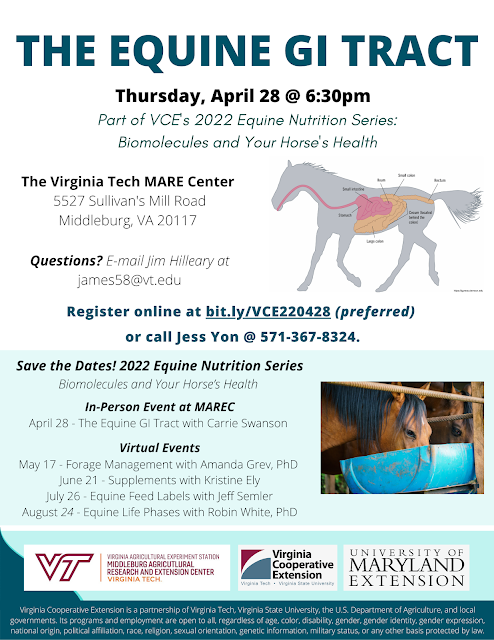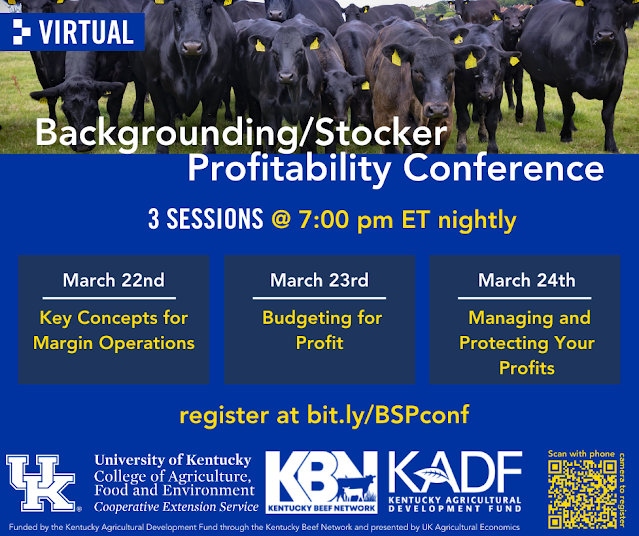A Taste
of Farming
October
2022 to March 2023
Are you aspiring
to farm or just starting out with farming?
If so, this “learn as you go” online series is for you! It is designed to help
you get a taste of different farming practices and concepts so you can explore
your interests, gain a basic understanding of different farming topics, avoid
common pitfalls, and get to know the Extension professionals in Virginia here
to assist you. In this Series, Virginia Cooperative Extension (VCE) Ag agents
and VSU Small Farm Outreach Program Associates post short videos (15-20 min)
highlighting key information and considerations about different topics they
have years of experience helping aspiring and new farmers navigate. Season 1
ran from October 2021 to March 2022 and videos are archived on the Virginia
Beginning Farmer and Rancher Coalition Taste of Farming webpage. All of the videos are also on a playlist on the Virginia Beginning Farmer and Rancher
Coalition YouTube Page.
We are excited to
announce Season 2, running from October 2022 to March 2023. Each month, we will
release two new Taste of Farming videos for you to watch! A few weeks after a
moderated Q & A session will be held with the presenters where you can hear
more from them and have your questions answered. Check out our schedule below
and on our website to watch the videos that have been released
and register for the moderated Q&A Sessions. Please share with your friends
and networks!
Please reach out to
Sarah Sharpe at seweaver@vt.edu
or Katie Trozzo ketrozzo@vt.edu
if you have questions.
November Moderated Q& A Session (Please register to join)
Thursday, November 10 from 7-8 pm ET
- Nicole
Shuman, Goochland County VCE Ag Agent
How to Interpret a Soils Test, video is available now!
- Mike Parrish, Dinwiddie County VCE Ag Agent
Information for New Pesticide Applicators, video is available now!
December Moderated Q& A Session (Please register to join)
Thursday, December 8 from 7-8pm ET
- Erin
Small, Prince Edward VCE Ag Agent
Floriculture, video will be available on November 14!
- Beth Sastre, Loudoun VCE Ag Agent
Vineyard Establishment, video will be available on November 14!
January Moderated Q& A Session (Registration
coming soon)
Date TBD
- Kevin
Spurlin, Grayson County VCE Ag Agent
Ashley Edwards, Carroll County VCE Ag Agent
Christmas Tree Farming, video will be available on December 12!
- Speaker TBD
Tree Fruit Production, video will be available on December 12!
February Moderated Q& A Session (Please register to join)
Thursday, February 23 from 7-8pm ET
- Mandy
Fletcher, VSU Small Farm Outreach Program Assistant SW VA Region
Sheep and Goat Production, video will be available on January 16
- Sarah Sharpe, Greene VCE Ag Agent
Direct Marketing Meat, video will be available on January 16!
March Moderated Q& A Session (Registration
coming soon)
Date TBD
- Tracy
Porter, VSU Small Farm Outreach Program Assistant, Northern Neck, Middle
Peninsula, Eastern Shore Region
Poultry Production, video will be available on February 13!
- Jeremy
Daubert, Rockingham County VCE Ag Agent
Cynthia Martel, Franklin County VCE Ag Agent
Starting a Small Dairy (Cows and Goats), video will be available on February 13!
If you
are a person with a disability and desire any assistive devices, services or
other accommodations to participate in this activity, please contact Katie
Trozzo at 540-231-4582 during business hours of 9 a.m. and 5 p.m. to discuss
accommodations at least 5 days prior to the event.
Virginia
Cooperative Extension is a partnership of Virginia Tech, Virginia State
University, the U.S. Department of Agriculture, and local governments. Its
programs and employment are open to all, regardless of age, color, disability,
gender, gender identity, gender expression, national origin, political
affiliation, race, religion, sexual orientation, genetic information, military
status, or any other basis protected by law.
-























